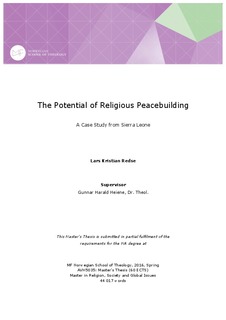| dc.description.abstract | It is the purpose of this thesis to further knowledge and understanding of religious
peacebuilding, and the added value of religious actors in peace processes. It is the proposition
of this author that religious actors can play a constructive part in peacebuilding processes.
From this proposition, if true, follows the question of how religious actors can contribute, and
what roles they can play.
The research is done in the form of a case study, looking at the work of the
Interreligious Council of Sierra Leone during the Sierra Leonean civil war, as remembered
and presented in in-depth interviews with twelve members of the Council’s executive board
during the war. The above proposition is tested through an analysis of their answers to the two
following questions, in light of existing literature:
1. Why and how were the IRCSL able to achieve what they did in Sierra Leone – and did
their religious foundation make a difference or not?
2. What, if anything, can religious peacebuilders elsewhere learn from their experiences?
The example of the IRCSL identifies context, relationships and trust, credibility and
objectivity, and a focus on the peace-enhancing principles of religion as having been vital for
the Council’s achievements during the peace process. Hence, though findings confirm that
religious actors can contribute positively in peacebuilding, they also suggest that their
potential is dependent on several factors.
In a supportive context, their often nationwide networks, combined with their position
and role in society, and the particular knowledge and expertise that follows their profession,
can make religious leaders ideal peacebuilders. However, to be able to capitalize on their
strengths, should the need arise, they need to focus on building cultures of peace within their
respective institutions – to establish a positive context – and actively seek out and build
relationships with society around them. | nb_NO |
